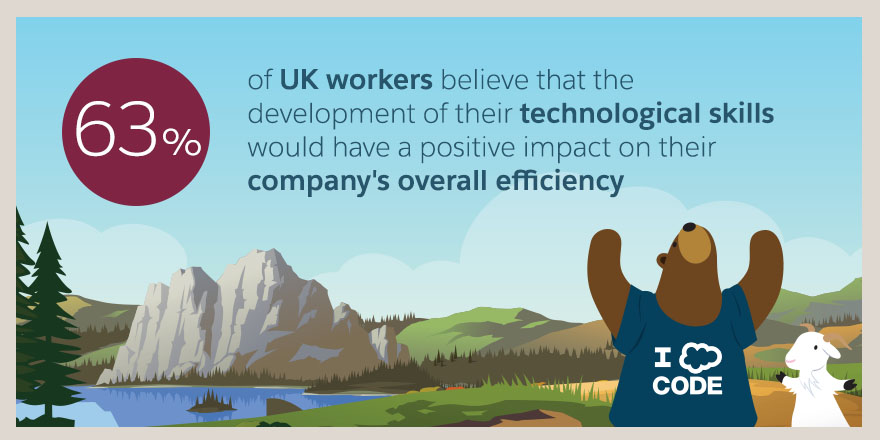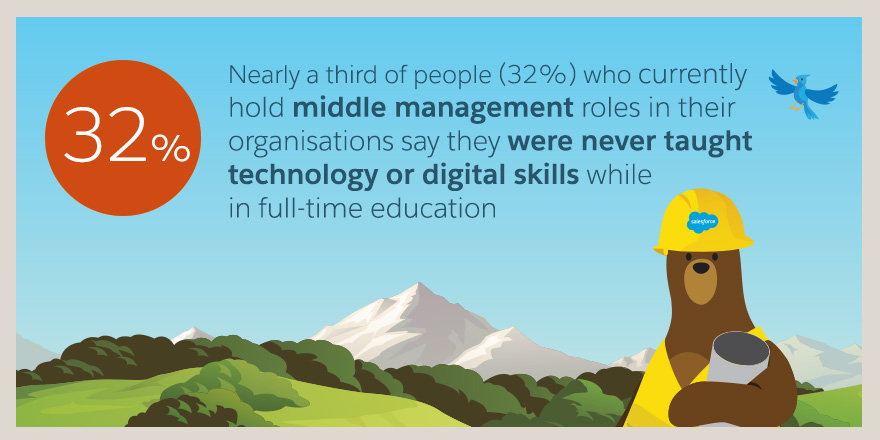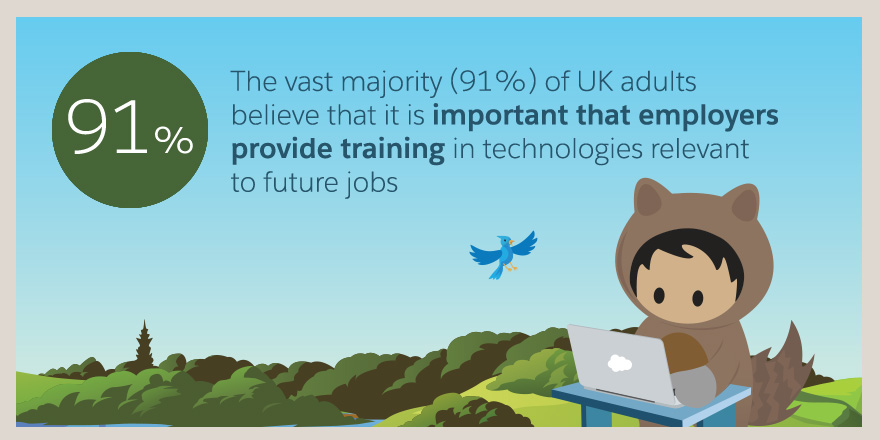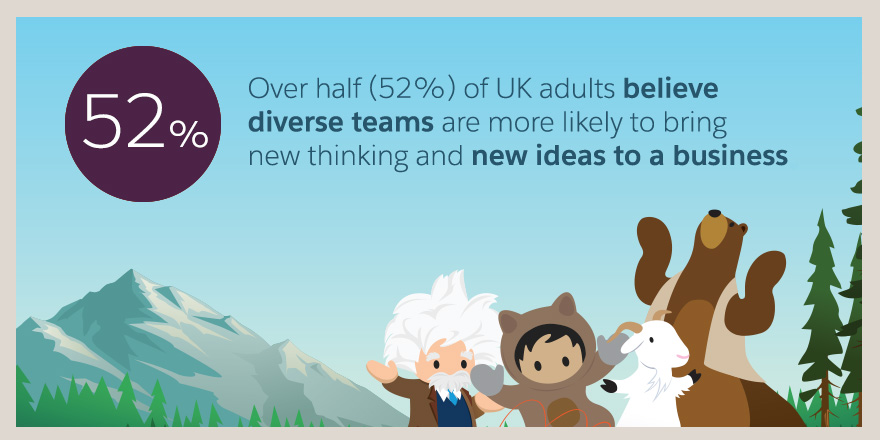There is a tension at the heart of the Fourth Industrial Revolution and its impact on the UK market. On the one hand, the increased use of smart technology, such as AI and machine learning could improve employee efficiency and help to solve the UK’s major employee output problem. However, there's also a fear that it could leave individuals struggling to keep up with the jobs of the future. Businesses have a responsibility to help employees to thrive in the Fourth Industrial Revolution, but how can they overcome the risks?
New research from Salesforce, carried out by YouGov, uncovers that the key to helping employees to thrive during this continued era of technological advancement, is to encourage a fundamental transformation of what we define as “education”. Businesses need to recognise that in 2018 and beyond, the ceremonial throw of a graduation cap is no longer enough to ensure someone is primed for the future workforce.
The study of over 2,000 UK workers, job seekers and students revealed that all three groups agree that continuous lifelong learning is essential when the pace of technological development is rapidly increasing. But, in many cases, they feel that employers continue to value traditional education paths, such as university degrees, most highly. The responses show that employers need to recognise and support other forms of learning and experience equally, alongside more traditional paths. This way, businesses can ensure that fair opportunities are provided to people off all backgrounds across the UK, while building a diverse team that is best-placed to thrive in the workplace of the future.
Embrace the enthusiasm

The results show that the UK workforce believes in the potential of digital change. The study uncovered that 63% of UK workers think that developing their technological skills would have a positive impact on their company's overall efficiency. Younger workers (18-24 year-olds) are the most enthusiastic, with 69% believing that greater tech skills development would help make their companies more efficient – compared to 53% of respondents aged 55 and above.
Businesses therefore have a fantastic opportunity to capitalise on this positive sentiment and transform the way they develop their teams' tech skills. They can take this employee enthusiasm and run with it, boosting efficiency and morale in the process.
Preparing for the jobs of tomorrow

The study reveals some concern, though, that the Fourth Industrial Revolution poses risks to future job prospects.
More than one in three workers (37%) in the UK believe there is a risk they won’t be able to get a job if they don't acquire the skills to match future technology. The youngest workers, job seekers and full-time students are most likely to have these fears, with 54% expressing this sentiment.
However, individuals with the highest levels of education are the most likely to believe that a lack of further digital education will cost them a future job. This is a view held by nearly half (48%) of UK adults with a master's degree or a PhD, followed by undergraduate university students at 43%.
Towards truly digital education

More than 30% of people who left full-time education less than a year ago and almost half (48%) of those who left full-time education between one and five years ago say technology and digital skills were taught poorly when they were last in full-time education.
Meanwhile, nearly a third (32%) of people who currently hold middle management roles in their organisations say they were never taught technology or digital skills at school, college or university. More than half of UK adults (54%) claim that they were neither proactively encouraged nor discouraged to pursue a career in technology by teachers or lecturers and some (7%) were even proactively discouraged to do so.
There’s a clear gap here, but it won't be filled by simply demanding that the education system instigates change. No individual company, government or politician can solve a societal challenge of this scale on their own. Preparing more workers for the jobs of the future requires a concerted effort between organisations across industries and geographies, as well as partnership between the public and private sectors. Business has a crucial role to play in driving this.
Workers want lifelong learning
The vast majority (82%) of UK workers are advocates of lifelong learning. They see continuous training in technology as crucial to succeeding in your career today and in the future, a statement with which 89% of full-time students agree.
Again, the message is clear, it’s time for businesses to move away from one-off traditional courses, to highly-tailored continuous learning, perhaps via online courses.
The onus for change is on employers

The vast majority (91%) of UK adults believe that it is important that employers provide training in technology relevant to future jobs – the same percentage that think schools and universities should do so. However, more than a quarter (27%) of UK workers don't think the opportunities currently offered by employers are adequate for this goal.
People do, though, want this training to happen at work. More than two fifths (43%) of adults who are in work, full-time education or seeking employment claim they would be more likely to pursue on-the-job training than any other type of tech-skills development (including formal education). A mere 9% of UK adults would consider taking up traditional education courses like a university degree or A-levels.
It's time for employers to meet this demand and take a more holistic view of their employees' skills. One way to do this is by providing learning in the location where it's most requested – in the workplace.
Driving for diversity

More than half (52%) of UK adults believe diverse teams are more likely to bring new thinking and new ideas to a business. This rises to 62% in London, with 70% of full-time students also believing this to be true.
Creating a diverse team is crucial for businesses that want to innovate at speed. Looking beyond candidates that have followed a well trodden path and embracing employees from a variety of backgrounds and experiences brings fresh ideas and new perspectives that are needed in this unprecedented era of change. By opening up access to education and recognising new models of learning - ranging from apprenticeships to online learning - businesses can tap into the potential of a more diverse range of skilled talent.
Roll with the revolution
The tools to help companies deliver the next generation of digital learning are here. At Salesforce we’ve developed an online learning platform, Trailhead, which helps employees like Marcelle Braithwaite from Cloudshift Group to take control of their future and develop tech-led skills as they work. It’s free, can be easily customised and its open to everyone. The gamified design lets users unlock new platforms as their learning progresses. To date more than 250,000 Trailhead badges have been earned in the UK.
Developing a workforce that is Fourth Industrial Revolution-ready requires a clear commitment from businesses to provide ongoing lifelong training in digital skills, which are acessible to all. For more information on Salesforce's free, online learning platform, which is open to anyone, see: https://trailhead.salesforce.com/
Methodology
All figures, unless otherwise stated, are from YouGov Plc. Total sample size was 2061 adults. Fieldwork was undertaken between 19th - 20th April 2018. The survey was carried out online. The figures have been weighted and are representative of all UK adults (aged 18+).








